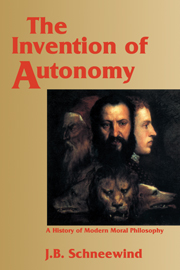Book contents
- Frontmatter
- Contents
- Preface
- Acknowledgments
- A note on references and abbreviations
- Introduction
- Part I The rise and fall of modern natural law
- 2 Natural law: From intellectualism to voluntarism
- 3 Setting religion aside: Republicanism and skepticism
- 4 Natural law restated: Suarez and Grotius
- 5 Grotianism at the limit: Hobbes
- 6 A morality of love: Cumberland
- 7 The central synthesis: Pufendorf
- 8 The collapse of modern natural law: Locke and Thomasius
- Part II Perfectionism and rationality
- Part III Toward a world on its own
- Part IV Autonomy and divine order
- Epilogue
- Bibliography
- Index of names
- Index of subjects
- Index of biblical citations
6 - A morality of love: Cumberland
Published online by Cambridge University Press: 05 June 2012
- Frontmatter
- Contents
- Preface
- Acknowledgments
- A note on references and abbreviations
- Introduction
- Part I The rise and fall of modern natural law
- 2 Natural law: From intellectualism to voluntarism
- 3 Setting religion aside: Republicanism and skepticism
- 4 Natural law restated: Suarez and Grotius
- 5 Grotianism at the limit: Hobbes
- 6 A morality of love: Cumberland
- 7 The central synthesis: Pufendorf
- 8 The collapse of modern natural law: Locke and Thomasius
- Part II Perfectionism and rationality
- Part III Toward a world on its own
- Part IV Autonomy and divine order
- Epilogue
- Bibliography
- Index of names
- Index of subjects
- Index of biblical citations
Summary
Richard Cumberland (1631–1718), bishop of Peterborough, saw a profound threat to Christian morality and religion in what he called the “wicked doctrines” of Hobbes. A number of pamphleteers before him had taken potshots at the outworks of the Hobbesian fortress. Cumberland's De Legibus Naturae (1672) was the first attempt to mount a full-scale philosophical assault on the whole massive structure of Leviathan.
To counter Hobbes, Cumberland found it necessary to put forward a new theory of morality. Experience, he thought, teaches us that we are required to work together for the greatest possible happiness. Because he asserted this particular basic principle Cumberland has long been thought of as the first utilitarian. If the characterization is overly simple, there is still a substantial amount of truth in it. But Cumberland's reasons for asserting the principle were very different from those that led the later writers who called themselves utilitarians to their version of it. They sought a publicly acceptable rationale for political and social reform. Cumberland saw his principle as the only one that could embody a morality common to God and human beings – and that, in so doing, could rebut Hobbes's denial of the possibility of such a morality. He was not a reformer. But he was the first philosopher who created an important new ethical theory because he thought it was morally required in order to defeat voluntarism.
- Type
- Chapter
- Information
- The Invention of AutonomyA History of Modern Moral Philosophy, pp. 101 - 117Publisher: Cambridge University PressPrint publication year: 1997



